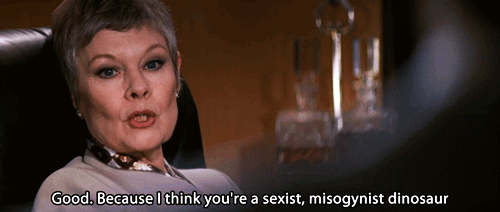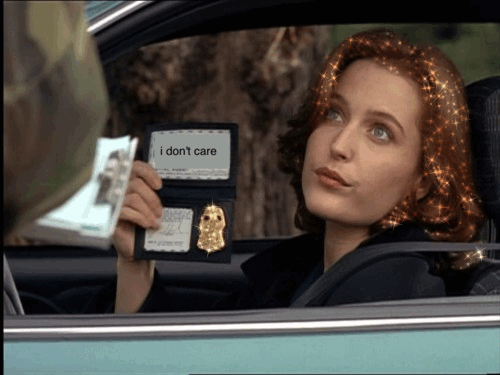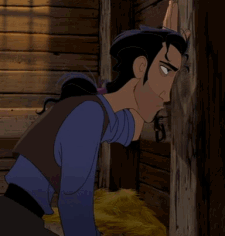One of the things about reading this in ebook format is that I'm not sure how much of the typesetting is intentional. There is, for example, the technique wherein an author gives a single sentence its own paragraph, even if (or especially because) it's very short, in order to give it more weight and time within the reader's mind. Like pretty much all writing techniques, this can be used well, and it can be gruesomely overused. In my old hometown, there was a weekly glurge columnist who, without fail, made every single sentence its own paragraph. I'm sure a lot of that had to do with stretching a 500-word column into an 800-word space, but it also served to make it seem like every single detail of the week's anecdote carried the weight of a lifetime's wisdom, heavy on the branch as a late-summer raspberry.
Dresden does a lot of this.
But I can't tell if it's Butcher's authorial choice to do so or if it's just a quirk of the page-to-data translocation, so I can't in good faith snark at him for it. I can at least point out that I don't think there's any way all of the half-hearted attempts to add gravitas to a sentence are the whimsy of automatic formatting software, so he's probably guilty; we just don't know how much.
Storm Front
Chapter Three: When Being Super Gay Is Not Enough*
Dresden describes his first glance at crime-monarch Johnny Marcone with a level of detail usually reserved for YA love interests. Salt-and-pepper hair, laugh lines, "his eyes were the green of well-worn dollar bills", "good-looking, tanned, athletic, and enthusiastic", all of which he prefaces by saying Marcone "didn't look like the sort of man who would have my legs broken or my jaw wired shut", just in case any of us thought there was the slightest chance Dresden wasn't a straight cis white man.
Dresden tries to banter with the hired goon, Hendricks, and Marcone is not amused, which seems to be the correct response to basically everything Dresden does. Dresden guesses he's supposed to be more submissive, but rejects the Godfather movie tropes (which is an opportunity for him to throw in that Dresden has an actual faery godmother, "but that's another story", which sounds better already). Marcone in fact wants to hire Dresden full-time for the next two weeks to not-investigate the death of Tommy Tomm (Jessica Stanton, the dead woman, is not mentioned). Dresden says he doesn't think it's going to work out, even for double his usual fee, and dramatically locks eyes with Marcone.
Pictured: A very hetero eye-locking, courtesy of Jemma Salume.
Marcone doesn't look away, and Dresden explains that dealing with magic just gives you a new perspective on the world, which can create a second of perfect clarity with someone else in which you see each other exactly as you truly are. This second spins out into a full page detailing Marcone's soul:
He was a soldier, a warrior [....] he was going to get what he wanted and he was going to get it in the most efficient way possible. He was a dedicated man--dedicated to his goals, dedicated to his people. [....] There, hidden away from his everyday thoughts, there lurked a secret shame [....] I was, on some instinctual level, certain that he had been aware of what I would see if I looked--that he had deliberately met my gaze, know what he would give away. That was his purpose in getting me alone.I seriously considered at this point whether it was possible I had accidentally downloaded the erotic fan-redux of the Dresden books. I mean, the easy thing to do at this point is point out how incredibly not-hetero this scene seems and start reinterpreting the text, like I did for Ender and Rand and Mat/Perrin, but I've already tread that ground, and I think Dresden is going to give us a sterling opportunity for a different kind of case study: not in the closeted hero of the subtext, but in a specific kind of classic patriarchal view. Detective Murphy got a similarly-detailed physical description, though obviously it was a bit more lurid than "good-looking", but she got nothing like this kind of prolonged Rhapsody In Man, an ode to the strength and vigor and businesslike rationality of an aristocratic predator with a challenged dominion. Does Murphy even have feelings, apart from showing appropriate disgust at dead bodies and consternation at Dresden's recalcitrance? She's a cop trying to solve homicides in an era where 'faery geas' and 'vampire munchies' are going to get their own police codes soon. Does Dresden not have anything to tell us about her perspective? Guardian of her city, standing steadfast against the vast unknown? Not nearly as much as he has to say about her legs, which he has seen so little of in those pantsuits.
The gay male community gets stereotyped as the natural allies (and sassy sidekicks) of women, but it shares this with traditional patriarchy: when men are the only people who are considered to be full people, with thoughts and emotions that are worth giving attention, you get a kind of misogyny that looks identical, whether the perpetrators are straight, gay, cis, trans, ace, bi, whatever. The thesis either way is that women are accessories (or support staff, or sex-providers) and men are people.
It could be fun to theorise about Harry Dresden, Closeted Queer Wizard PI, but it wouldn't actually add any depth to the story. In Ender's books, his strong male-attracted subtext illustrates for us some really important things about his world and the beliefs of the author and how both try to force people to fit a specific mold for a 'greater good' that is really just about the personal tastes and power fantasies of the man in charge. Here in Dresdenville, Harry is equally misogynistic whether he wants to jump Marcone or not.
Back to the book. The two-way nature of the "soulgaze" (pfffbwahahaha) means Marcone gets to see inside Dresden as well:
Most people who did that got really pale, at least. One woman had passed out entirely. I didn't know what they saw when they looked in there--it wasn't a place I poked around much, myself.We have long since passed the point where I'll allow Butcher to pour this kind of 'my protagonist is such a badass you don't even know' all over us without having him actually do anything of note.
Marcone is unperturbed by what he sees in Dresden, which leaves Dresden scared and angry, but rather than threaten him, Marcone just tells him it's in his best interest not to investigate the deaths. He also says he's heard that Dresden is a real "magus", which is not a word we've encountered so far, and I'm left wondering yet again if there's any pattern to the terminology they'll use in this world. (Dresden has consistently called himself a wizard and implied that this is a subsection of the broader 'sorcerer'.) They both tell each other not to make enemies of them in typical Manly Posturing form and then part ways. Dresden spends the rest of the chapter walking up the stairs to his office and thinking again about how thoroughly Marcone came out the dominant victor in their whole exchange (another mention of "those dollar-bill-colored eyes" and "the sudden intimacy of the soulgaze"), finally asserting that he will be on time for his appointment.
(I would like to note again that this is complete rubbish, as it would have required Dresden to get out of the hotel, walk some blocks, argue with Hendricks, get into Marcone's car, have the whole discussion, get out, and climb up to his office in less than five minutes. I say once more: if authors don't want me to complain about their terrible timelines, they need to stop being so specific about the time when it's actually a throwaway guess.)
Chapter Four: Maybe She's Born With It (Maybe It's Overwhelming Misogyny)
So now we meet Monica, who also gets a long physical description that's mostly about how attractive she is: "good-looking", which is an interestingly neutral phrase that I thought he used for Marcone specifically because it was so detached, "ash blond", "makeup tasteful and well applied", "face was fair, friendly, with enough roundness of cheek to look fresh-faced and young".
I'm trying to figure out Dresden's deal. He supposedly does simple divination--lost items especially--and he's a capable wizard with a secret past, but is he actually supposed to be a trained detective? Did he have time for that and wizard school? Was he apprenticed to a previous wizard PI? Because some of the things he notes, like well-applied tasteful makeup, are really specific details to pick out about a person, especially from the perspective of a scruffy man like Dresden. Judging by the memes these days, roughly half of men think that women naturally exude makeup from their pores whenever their internal biology realises it's time for them to seek male validation. I feel like Dresden sits more comfortably in that demographic than in the one that sees a woman for the first time and immediately ascertains whether her makeup is 'tasteful'.
Dresden apologises for being late after all and opens his office up for her, offering the police as an excuse and then immediately moving along when corpsey memories rise to the surface again. Dresden of course still has enough arrogance to be quietly snide about how jumpy she looks--in the same breath talking about going through familiar coffee-making motions to calm himself down from his Marcone soul-touching. I want to think this is intentional but I don't think we're supposed to scorn Dresden this much.
Monica's husband has been missing for three days--not in a mysterious abduction way, but in a 'packed up and left without a word' way, and she came to Dresden because this followed her husband's sudden interest in magic.
"He had been buying books on it in the religion section at the bookstore. Not like those Dungeons and Dragons games. The real thing. He bought some of those tarot cards." She pronounced it like carrot. Amateurs.Real magic, not like D&D, but like the Chapters shelf containing the complete works of Silver RavenWolf. And what exactly is Dresden's issue with this distressed woman not knowing how to pronounce tarot? She's not claiming to know a thing about magic and he looks down on her while she comes to him for help? Jackass.
She had a good face for blushing, fair skin that colored girlishly. [Monica explains the stress her husband has been under lately.] She took a deep breath, as if the effort of completing so many sentences without a single um had tired her.I wish I could hate you to death, Dresden. [Erika: If you're going to infantilise someone this much, at least offer them a lollipop.]
Monica didn't go to the police because she knows that if you don't take magic seriously, this looks like a simple 'man ditches family voluntarily' situation, while she believes he is still out to provide for them after losing his job. Dresden starts asking for those tiny key details like where he works at what his name is, and Monica hesitates a long time before finally saying 'George', because apparently her girlish brain hasn't already worked out how difficult it would be to find a person without knowing anything but their gender. Dresden tries to calm her down, quoting Marcone's line about 'good business' and not hexing your clients.
She gave a nervous little laugh. "I feel so silly," she confessed. [....]
The woman was nervous and had certain expectations. I might ease her fears a little if I fulfilled some of them.I hoped this would mean he'd do something magical and obviously beneficial at this point, but no dice. He gives a prolonged speech yet again about how working with magic helps people see things from new perspectives and understandings and there are lots of scary stories about horrible wizards but she just needs to trust him and he won't disappoint her. Books about horrible wizards? This came out in 2000; the big name in wizardry at that point was Harry Potter and everyone was preparing to stay up all night for the Goblet of Fire launch. I understand Dresden not working that directly into his world, but it's a bit of rewritten history to suggest that wizards are the villains more often than the heroes in modern literature.
So the missing man's real name is 'Victor Sells', which sounds like a pseudonym to be used in some secret spy conversation, but okay. She suggests that he may have gone to:
"The lake house. We have a house down by..." She waved her hand.
"The lake?"
She beamed at me, and I reminded myself to be patient.FIGHT ME JIM BUTCHER.
This is just so unnecessary. Why is he working so very hard to convince us that Monica is so incredibly useless and stupid? Is it a front? Is she a secret villain and she's trying to play the role of an airheaded housewife while she gets the measure of her soon-to-be-nemesis? That's it, right? Because that is the only explanation that makes this scene some percentage less than pure industrial-grade Blue Sky misogyny. I desperately hope there is a scene coming where Monica gets to be all "I thought I was completely over the top, but wow, you're such a disgusting sexist that you bought the whole thing." (It is rather convenient, since her 'nervousness' means she doesn't give Dresden her real name or make direct eye contact with him, which might reveal her secrets.)
Anyway. Dresden asks for a photo, to see Victor's magic books, and to check out the lake house, which Monica approves--she hands over an envelope full of cash, another with a magic charm, and a third with her phone number and a photo of her husband.
"I'm not cheap. It might be less costly for you to hire someone else."
"We've got quite a bit of savings, Mr. Dresden," she told me. "I'm not worried about the money." That seemed an odd statement from her, at the time--out of tune with her generally nervous manner.Okay, I am fully predicting now that Monica is playing Dresden. She's not going to the cops because Victor isn't really her husband and he's been using magic to throw off her tracing, but won't be expecting Dresden. In which case: Jim Butcher, my demands that you fight me are withdrawn on a probationary basis.
Monica leaves after 'accidentally' letting it slip that she needs to pick up her kids from school and getting Dresden's assurance that he will contact her within a couple of days. He checks the envelopes;the first two ten $50 bills, a photo of Monica with "a man of lean and handsome features, with forehead and shaggy eyebrows that skewed his handsomeness off onto a rather eccentric angle" (everyone is hot in this book except Carmichael, what's with that), and her phone number. Dresden notes how weird it is that Monica was ready to give him so much information that he could use to find out her name but not actually speak it aloud, but brushes it off as typical client foolishness which he'll have to resist the urge to mock her about later. Monica is definitely playing him and Dresden is terrible.
Final envelope: a dried scorpion husk, immediately identified as a potential focus for nasty magic, to be worn uncomfortably against the skin. (Much talk of how its claws could catch in your chest hair or jut into your breasts.) Dresden notes that he can't actually tell if it's magical or not without trying to use it, which is a detail I actually like quite a lot--most wizardy worldbuilding seems to have magic things radiate an aura of power like they're radioactive, and while 'magic as potential/kinetic energy' makes sense given the prominence of nuclear power in the last century, I want to see more of 'magic as verb' and... oh. Never mind.
Cautiously, I extended my senses toward it like an invisible hand, feeling about for any traces of enchantment or magical energy.
Nothing. It was as dry of enchantment as it was of life.Okay, so he does just have Detect Magic. Business as usual. He thought he saw it move, found it was entirely unanimated, shoved it into his desk drawer, and the chapter ends. I guess it could have been worse?
I've said in discussion before that while 'sexist' is certainly a legitimate flaw for a character to have, it tends to be the kind of flaw a character doesn't actually suffer for, which means that to plenty of (sexist) readers it reads as a neutral or positive trait. If you are not sexist, and you for some reason want to write a character who is, then the responsible thing to do is make it clear in text that it has negative effects, especially for them. There is, I hope, some chance that Dresden's sexism just got him completely hoodwinked by a rival wizard. If so, that might be the first time I have actually seen an author write a sexist protagonist whose sexism was explicitly a flaw that held them back from success.
I'm so wrong about this, I just know it.
Next week: Erika returns to talk about Love Never Dies, the deeply suspect sequel to Phantom of the Opera.
Two weeks: I face the tremendous challenge of staying on the high road when Dresden knocks off work to go to his favourite pub, McAnally's. 100% serious. Maybe there was a better way we could have transliterated that one from Gallic, eh?
---
*I suppose I should make a consistent note that these books don't have chapter titles and I'm just making them up for funsies, lest new readers be confused that the titles are so much more entertaining and thoughtful than the text.







